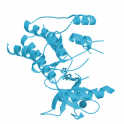
- Remove this product from my favorite's list.
- Add this product to my list of favorites.
Products
Newsletter
 |  |  |  |  |  |

Background
CTLA-4 (Cytotoxic T-Lymphocyte Antigen 4) is also known as CD152 (Cluster of differentiation 152), is a protein receptor that downregulates the immune system. CTLA4 is a member of the immunoglobulin superfamily, which is expressed on the surface of Helper T cells and transmits an inhibitory signal to T cells. The protein contains an extracellular V domain, a transmembrane domain, and a cytoplasmic tail. Alternate splice variants, encoding different isoforms. CTLA4 is similar to the T-cell co-stimulatory protein, CD28, and both molecules bind to CD80 and CD86, also called B7-1 and B7-2 respectively, on antigen-presenting cells. CTLA4 transmits an inhibitory signal to T cells, whereas CD28 transmits a stimulatory signal. Intracellular CTLA4 is also found in regulatory T cells and may be important to their function. Fusion proteins of CTLA4 and antibodies (CTLA4-Ig) have been used in clinical trials for rheumatoid arthritis.
Source
Recombinant Biotinylated Humane CTLA-4, Mouse IgG2a Fc,Avitag (CT4-H82A3) is expressed from human 293 cells (HEK293). It contains AA Ala 37 - Phe 162 (Accession # P16410-1).
Predicted N-terminus: Ala 37
Molecular Characterization
This protein carries a mouse IgG2a Fc tag at the C-terminus, followed by an Avi tag (Avitag™).
The protein has a calculated MW of 42.1 kDa. The protein migrates as 50-55 kDa under reducing (R) condition (SDS-PAGE) due to glycosylation.
Biotinylation
Biotinylation of this product is performed using Avitag™ technology. Briefly, the single lysine residue in the Avitag is enzymatically labeled with biotin.
Biotin:Protein Ratio
Passed as determined by the HABA assay / binding ELISA.
Endotoxin
Less than 1.0 EU per μg by the LAL method.
Purity
>95% as determined by SDS-PAGE.
Formulation
Lyophilized from 0.22 μm filtered solution in 50 mM Tris, 100 mM Glycine, 25 mM Arginine, 150 mM NaCl, pH7.5. Normally trehalose is added as protectant before lyophilization.
Reconstitution
Please see Certificate of Analysis for specific instructions.
For best performance, we strongly recommend you to follow the reconstitution protocol provided in the CoA.
Storage
For long term storage, the product should be stored at lyophilized state at -20°C or lower.
Please avoid repeated freeze-thaw cycles.
This product is stable after storage at:
-20°C to -70°C for 12 months in lyophilized state;
-70°C for 3 months under sterile conditions after reconstitution.
Bioactivity
Please refer to product data sheet.
(1) "LAG-3 as a Potent Target for Novel Anticancer Therapies of a Wide Range of Tumors"
Sauer, Szlasa, Jonderko et al
Int J Mol Sci (2022) 23 (17)
(2) "Transcript Engineered Extracellular Vesicles Alleviate Alloreactive Dynamics in Renal Transplantation"
Lin, Lv, Yu et al
Adv Sci (Weinh) (2022)
(3) "Immune checkpoint inhibitor-induced hepatitis injury: risk factors, outcomes, and impact on survival"
Miah, Tinoco, Zhao et al
J Cancer Res Clin Oncol (2022)
Showing 1-3 of 11918 papers.
Welcome Login
Contact us
Follow us